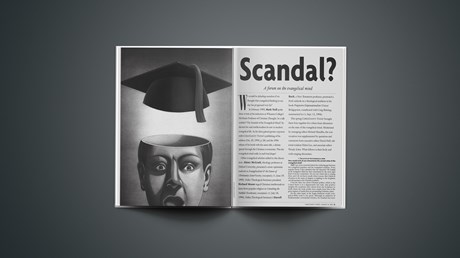This ad will not display on your printed page.
In February 1993, Mark Noll spoke these words at his induction as Wheaton College’s McManis Professor of Christian Thought. In a talk entitled “The Scandal of the Evangelical Mind,” he decried the anti-intellectualism he saw in modern evangelical life. As his ideas gained greater exposure with Christianity Today’s publishing of his address (Oct. 25, 1993, p. 28) and the 1994 release of his book with the same title, a debate spread through the Christian community: Was the evangelical mind really in such bad shape?
Other evangelical scholars added to the discussion. Alister McGrath, theology professor at Oxford University, presented a more optimistic outlook in Evangelicalism & the Future of Christianity (InterVarsity; excerpted, ct, June 19, 1995). Fuller Theological Seminary president Richard Mouw urged Christian intellectuals to learn from popular religion in Consulting the Faithful (Eerdmans; excerpted, ct, July 18, 1994). Dallas Theological Seminary's Darrell Bock, a New Testament professor, promoted a fresh outlook on a theological tradition in his book Progressive Dispensationalism (Victor/Bridgepoint, coauthored with Craig Blaising; summarized in ct, Sept. 12, 1994).
This spring Christianity Today brought these four together for a three-hour discussion on the state of the evangelical mind. Moderated by managing editor Michael Maudlin, the conversation was supplemented by questions and comments from executive editor David Neff, editorial resident Helen Lee, and associate editor Wendy Zoba. What follows is their lively and wide-ranging discussion.
I. The state of the evangelical mind
How would each of you characterize the current state of the evangelical mind?
Noll: I am most concerned about the widening gap between the evangelical populace and the evangelical academy. Every popular forum I have attended that has discussed The Scandal of the Evangelical Mind has been dominated by the most rigid kind of six-day creationism. I’m not ...


